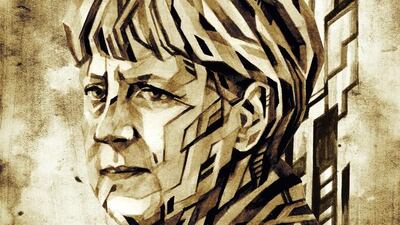It is difficult to reconcile perceptions of Angela Merkel as the world's most powerful woman with her origins as the bookish daughter of a pastor growing up under communism in the East Germany of the Cold War.
Merkel's status in the modern world is not in serious doubt, even if her own advisers dismiss it as media gimmick. Her global prominence soared as she shifted emphasis to intervene on issues ranging from rampant eavesdropping by United States intelligence agencies to the conflict in Ukraine and the threat to national and international security from extremism.
See all our Year in Review coverage
While Margaret Thatcher was a formidable prime minister of Britain and a staunch ally of the United States, the German chancellor’s reach crosses borders, to give her unprecedented influence throughout the 28-nation European Union.
Irrespective of the rotating presidency of the EU’s executive branch, the European Commission, it is Merkel who, for most of her nine years in office, has been commonly seen as the bloc’s leader. Her will and her vision have guided its handling of the deep and enduring financial crisis, forcing unwelcome medicine down the throats of ailing member states as the price of bailouts. This rigorous approach has brought her admirers, but also enemies in the countries most severely affected by these harsh remedies.
Around the world, opinion is sharply divided. Two comments posted by readers to a recent lengthy profile in the US magazine Vanity Fair probably sum up the divergence of views. One described her as “the best European politics [has had] to offer since decades … focused, equipped with an outstanding analytical brain”. A detractor immediately retorted that Merkel was the “cancer of Europe”, responsible for its continued recession and a likely break-up of the EU.
Merkel, who turned 60 this year, one day after Germany won the World Cup final in Brazil, was born Angela Dorothea Kasner in what was the West German port of Hamburg, but took and kept the name of her first husband, a fellow physicist, even though the marriage lasted only five years.
She moved to East Germany with her family as a child, when her father received a pastorate in the small town of Templin, 80 kilometres north of Berlin. She pursued the familiar path of young people living in Warsaw Pact countries, learning Russian and becoming an active member of the communist youth movement, then a prerequisite of university acceptance.
If this background sits uneasily with her political career in the centre-right Christian Democrat Union of reunified Germany, Merkel had pro-western sympathies from an early age. Marxism-Leninism studies were compulsory but, despite being a diligent student, her grades were no better than basic passes.
Like Thatcher, she commands more respect than affection, earning such unflattering nicknames as mutti – mummy – and Das Merkel, with its use of the gender-neutral definite article das.
Despite wobbles, including current ones, the German economy has withstood the ravages of global economic decline better than almost all others.
She pulled no punches in dealing with the United States over the bugging allegations, which include claims that Washington’s national security agency hacked her mobile phone conversations for 10 years or more; she reportedly told the US president Barack Obama that the agency had behaved like the Stasi, the old East German state security service.
And Merkel has emerged as the western leader best able to grapple with the Russian president Vladimir Putin over Russian involvement in Ukraine. Her government’s decision to arm Kurds in their fight against ISIL was a momentous departure from post-war German practice.
However cautious she may sometimes wish to appear, Merkel gives the impression of a woman in a hurry. As she once said: “The question is not whether we are able to change but whether we are changing fast enough.”
Colin Randall is a foreign correspondent for The National, based in France.


